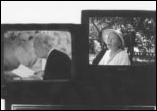(96.8.15 靖国篇) (Part Yasukuni, Aug. 15, 1996) |
|
 |
監督・脚本・編集・製作:土屋豊 Director, Script, Editing, Producer : Tsuchiya Yutaka |
| メディアが支配的な現代社会で、われわれが耳にする情報はテレビから流れるキャッチコピーばかりだ。世界各国のビデオ・アクティヴィストたちはそれに対抗してオルタナティヴで重要な情報を発信してきた。そんな日本のビデオ・アクティヴィストのなかでも、土屋豊は想像力たくましい部類に入る。土屋はWithout-Televisionを組織して、廉価ビデオを制作してきた。W-TVのシリーズ三作目になる『あなたは天皇の戦争責任についてどう思いますか』では、1996年8月15日の終戦51周年記念日に、靖国神社で、第二次世界大戦の悲劇に対する昭和天皇の責任について、参拝者にインタヴューしている。戦死軍人を奉っている靖国神社の主眼は軍国主義的な国家主義の宗教的な賛美であるから、驚くまでもなく、参拝者の多くは彼の質問に対し否定している。だが、土屋や撮影スタッフは、頭部に取り付けた小型カメラをつかって、参拝者にリラックスして自分の考えを話してもらうようにしたため、現代の天皇制イデオロギーの問題に関する興味深い視点を捕らえることができた。土屋はインタヴューの内容をダイレクトに批判することは避けて、インタヴューをデジタルに編集し、ちょうど他の報道機関に対抗する形でのメディア・イメージとして作品をつくりあげている。このような手法の作品を観るには、観る方も主流のテレビ番組を観るような人物ではなく、識別力・判断力を駆使して自分の確固たる意見を作り上げられるような人物でなければならない。 (アーロン・ジェロー) |
When most of the news we get in this media-dominated society is
the sound bites on TV, video activists throughout the world have
been providing an important information alternative. Tsuchiya
Yutaka has been one of the more imaginative examples in Japan,
producing low-cost videos through his organization Without Television.
The third episode in the W-TV series, What Do You Think asks visitors at Yasukuni Shrine on August 15th, 1996, the 51st
anniversary of the end of the war, the taboo question of whether
they think that Emperor Hirohito bore some responsibility for
the tragedy of WWII. It is not surprising that most of the respondents,
visiting a shrine to Japan's war dead which is more accurately
a religious glorification of militaristic nationalism, say no,
but Tsuchiya and his partner, using such devices as a head-held
camera, let them comfortably speak their minds, gaining an interesting
insight into the contemporary ideology of the emperor. Refusing
to criticize them directly, Tsuchiya digitally manipulates the
interviews to present them precisely as media images set against
other broadcasts, a strategy which demands a viewer different
from that of dominant television: one who is discerning and selective
and can make up his or her own mind. - Aaron Gerow |